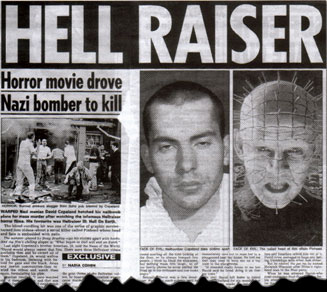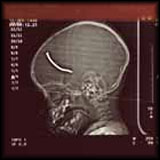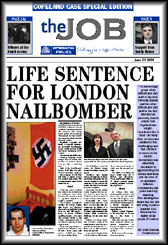
  

David John Copeland (born May 15, 1976) is a former member of the British
neo-Nazi National Socialist Movement who became known as the "London nailbomber"
after a 12-day bombing campaign in April 1999 aimed at London's black,
Asian, and gay communities.
Over three successive weekends, Copeland placed homemade nail bombs, each
containing up to 1,500 four-inch nails, outside a supermarket in Electric
Avenue, Brixton, an area of south London with a large black population;
in Brick Lane in the east end of London, which has a large Asian community;
and in the Admiral Duncan pub in Soho's Old Compton Street, the heart of
London's gay community. No warnings were given before the bombs exploded.

Several press reports
concerning nailbomber David Copeland concentrated
more on the fact that
he watched horror movies than on his actions.
- News of the World: July 2, 2000
The attacks claimed three lives, all in the Admiral Duncan. Andrea Dykes,
27, who was four months pregnant with her first child, died along with
her friends and hosts for the evening, Nick Moore, 31, and John Light,
32, who was to be the baby's godfather. Andrea's husband, Julian, was seriously
injured. The four friends from Essex had met up in the Admiral Duncan to
celebrate Andrea's pregnancy, when the bomb exploded after being taped
inside a sports bag and left near the bar. A total of 129 people were injured
in the three attacks, with four of the victims losing limbs and 26 suffering
serious burns.
Although Copeland was diagnosed with paranoid schizophrenia and a personality
disorder, his plea of diminished responsibility was not accepted by the
prosecution. He was convicted of murder on June 30, 2000, and received
six life sentences. |

Copeland was born in Isleworth, London, and brought up in Yateley, Hampshire,
where he attended Yateley comprehensive school and passed in seven subjects
in his General Certificate of Secondary Education. He apparently resented
that he was small for his age, and was given the nickname "Mr. Angry."
After his arrest, he told psychiatrists that he had started having sadistic
dreams when he was about 12, including dreams or fantasies that he'd be
reincarnated as an SS officer with access to women as slaves. He left school
when he was 16 to start an engineering apprenticeship, and became involved
in petty crime, drinking, and taking drugs, including heroin. He was said
in court never to have had a girlfriend, and feared that people might think
he was gay.
In May 1997, at the age of 21, he joined the British National Party, a
far-right, anti-immigration party that fields candidates in British elections.
Copeland acted as a steward at some BNP meetings, in the course of which
he came into contact with the BNP leadership and was photographed standing
next to John Tyndall, then BNP party leader. It was during this period
that Copeland first learned how to make bombs using fireworks with alarm
clocks as timers after downloading a so-called terrorists' handbook from
the Web.
Copeland was allegedly disappointed by the BNP, which had moved away from
advocating violence, and he left within a year. In 1998, he joined the
smaller, violent, openly neo-Nazi National Socialist Movement, becoming
its regional leader for Hampshire just weeks before the start of his bombing
campaign. It was around this time that he visited his family doctor and
was prescribed anti-depressants after telling the doctor he felt he was
"losing his mind."

Copeland's first attack, on Saturday, April 17, 1999, was in Electric Avenue,
Brixton, part of the so-called "frontline," a street made famous in the
UK by the 1981 Brixton race riots that took place there.
 Copeland made his bomb using explosive from fireworks and taped it inside
a sports bag before priming it and planting it outside the Iceland supermarket
on the corner of Electric Avenue. The market traders became suspicious
of it and moved it several times before it detonated just as the police
arrived, at 5:25 in the evening. Fifty people were injured, many of them
seriously because of the four-inch nails Copeland had packed around the
bomb. One victim was a 23-month-old toddler who had a nail driven through
his skull into his brain (see right), though he is believed to have made
a full recovery.
Copeland made his bomb using explosive from fireworks and taped it inside
a sports bag before priming it and planting it outside the Iceland supermarket
on the corner of Electric Avenue. The market traders became suspicious
of it and moved it several times before it detonated just as the police
arrived, at 5:25 in the evening. Fifty people were injured, many of them
seriously because of the four-inch nails Copeland had packed around the
bomb. One victim was a 23-month-old toddler who had a nail driven through
his skull into his brain (see right), though he is believed to have made
a full recovery.
Copeland's second bomb, on the following Saturday, April 24, was aimed
at Brick Lane, the center of the Bangladeshi area in the east end of London.
There is a famous Brick Lane street market on Sundays, but Copeland mistakenly
tried to plant the bomb on Saturday, when the street was quiet. Unwilling
to change the timer on the bomb, he left it instead in Hanbury Street,
where it exploded injuring 13 people.
Copeland's third bomb was planted and exploded on the evening of Friday,
April 30, in the crowded Admiral Duncan pub in Old Compton Street, the
center of London's gay village, killing Andrea Dykes, Nick Moore, John
Light, and injuring 79, many of them seriously, with four people requiring
limb amputations.

 The Anti-Terrorist Branch of the Metropolitan Police Service identified
Copeland from CCTV footage of Brixton. The image was given wide publicity
on Thursday, April 29, which caused Copeland to bring forward his bombing
of the Admiral Duncan to Friday evening. Paul Mifsud, a work colleague
of Copeland's, recognized him and alerted the police about an hour and
20 minutes before the bombing.
The Anti-Terrorist Branch of the Metropolitan Police Service identified
Copeland from CCTV footage of Brixton. The image was given wide publicity
on Thursday, April 29, which caused Copeland to bring forward his bombing
of the Admiral Duncan to Friday evening. Paul Mifsud, a work colleague
of Copeland's, recognized him and alerted the police about an hour and
20 minutes before the bombing.
Copeland was arrested that night once the police obtained his address,
a rented room in Farnborough, Hampshire. His mental state was assessed
at Broadmoor Hospital, but remained a matter of dispute at his trial. The
jury convicted him of three murders and three offenses of planting bombs,
and he was sentenced to six life sentences on June 30, 2000.

Though some groups did claim responsibility for the bombings, Copeland
maintained he had worked alone and had not discussed his plans with anyone,
which the police accepted.
During police interviews, he admitted holding neo-Nazi views, and talked
of his desire to be famous, to "spread fear, resentment, and hatred throughout"
the UK, and to "cause a racial war" in the UK. When asked why he had targeted
ethnic minorities and the gay community, he spoke of his belief that ethnic
minorities are "inferior", and of his hatred of gay people. Many publications
also focused on his love for horror films, stating that the violent images
caused him to kill.
Copyright ©
Wikipedia / TheFleshFarm.com
No images from this site may be reprinted or used elsewhere
without express consent from TheFleshFarm.com
(Just e-mail me first.)
fleshmaster@thefleshfarm.com

|

 Copeland made his bomb using explosive from fireworks and taped it inside
a sports bag before priming it and planting it outside the Iceland supermarket
on the corner of Electric Avenue. The market traders became suspicious
of it and moved it several times before it detonated just as the police
arrived, at 5:25 in the evening. Fifty people were injured, many of them
seriously because of the four-inch nails Copeland had packed around the
bomb. One victim was a 23-month-old toddler who had a nail driven through
his skull into his brain (see right), though he is believed to have made
a full recovery.
Copeland made his bomb using explosive from fireworks and taped it inside
a sports bag before priming it and planting it outside the Iceland supermarket
on the corner of Electric Avenue. The market traders became suspicious
of it and moved it several times before it detonated just as the police
arrived, at 5:25 in the evening. Fifty people were injured, many of them
seriously because of the four-inch nails Copeland had packed around the
bomb. One victim was a 23-month-old toddler who had a nail driven through
his skull into his brain (see right), though he is believed to have made
a full recovery.



